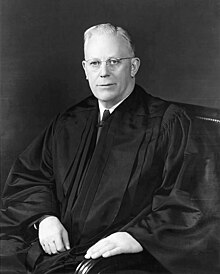Chief Justice Earl Warren
| Earl Warren | |
|---|---|
 |
|
| 14th Chief Justice of the United States | |
|
In office October 5, 1953 – June 23, 1969 |
|
| Nominated by | Dwight D. Eisenhower |
| Preceded by | Fred M. Vinson |
| Succeeded by | Warren E. Burger |
| 30th Governor of California | |
|
In office January 4, 1943 – October 5, 1953 |
|
| Lieutenant |
Frederick F. Houser Goodwin Knight |
| Preceded by | Culbert Olson |
| Succeeded by | Goodwin Knight |
| 20th Attorney General of California | |
|
In office January 3, 1939 – January 4, 1943 |
|
| Governor | Culbert Olson |
| Preceded by | Ulysses S. Webb |
| Succeeded by | Robert W. Kenny |
| Chair of the California Republican Party | |
|
In office 1932–1934 |
|
| Preceded by | Louis B. Mayer |
| Succeeded by | Justus Craemer |
| District Attorney of Alameda County | |
|
In office 1925–1939 |
|
| Preceded by | Ezra Decoto |
| Succeeded by | Ralph Hoyt |
| Personal details | |
| Born |
March 19, 1891 Los Angeles, California, U.S. |
| Died | July 9, 1974 (aged 83) Washington, D.C., U.S. |
| Political party | Republican |
| Spouse(s) | Nina Meyers |
| Children | 6 |
| Education | UC Berkeley (BA, JD) |
| Signature |  |
| Military service | |
| Allegiance |
|
| Service/branch |
|
| Years of service | 1917–1918 |
| Rank |
|
| Unit | 91st Division |
Earl Warren (March 19, 1891 – July 9, 1974) was an American jurist and politician who served as the 30th Governor of California (1943–1953) and later the 14th Chief Justice of the United States (1953–1969).
He is best known for the liberal decisions of the Warren Court, which outlawed segregation in public schools and transformed many areas of American law, especially regarding the rights of the accused, ending public school-sponsored prayers, and requiring "one man–one vote" rules of apportionment of election districts. He made the Supreme Court a power center on a more even basis with Congress and the Presidency, especially through four landmark decisions: Brown v. Board of Education (1954), Gideon v. Wainwright (1963), Reynolds v. Sims (1964), and Miranda v. Arizona (1966).
Warren is the only person elected to three consecutive terms as Governor of California, and with those three elected terms he is second only to Jerry Brown for total gubernatorial wins in California. Before holding these positions, he was the District Attorney for Alameda County, California, and the Attorney General of California.
Warren was the nominee of the Republican Party for Vice President in 1948, as the running mate of Thomas E. Dewey. He was appointed to chair what became known as the Warren Commission, which was formed to investigate the 1963 assassination of President John F. Kennedy.
...
Wikipedia
